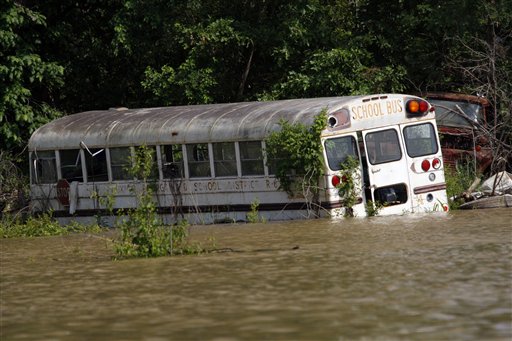MEMPHIS, Tenn. - The Mississippi River crested in Memphis at nearly 48 feet on Tuesday, falling inches short of its all-time record but still soaking low-lying areas with enough water to require a massive cleanup.
National Weather Service meteorologist Bill Borghoff says the river reached 47.85 feet at 2 a.m. Tuesday and is expected to stay very close to that level for the next 24 to 36 hours. Reaching its high point means things shouldn't get worse in the area, but it will take weeks for the water to recede and much longer for inundated areas to recover.
"Pretty much the damage has been done," Borghoff said.
The crest is just shy of the record of 48.7 feet at Memphis reached during a devastating 1937 flood.
The soaking in Memphis was isolated to low-lying neighborhoods, and forced hundreds of people from their homes, but no new serious flooding was expected. Officials trusted the levees would hold and protect the city's world-famous musical landmarks, from Graceland to Beale Street.
To the south, residents in the Mississippi Delta prepared for the worst. Farmers downriver built homemade levees to protect their crops and engineers diverted water into a lake to ease the pressure on New Orleans levees. Inmates in the Louisiana's largest prison were also evacuated to higher ground.
Scott Haynes, 46, estimated he would spend more than $80,000 on contractors to build levees around his house and grain silos, which hold 200,000 bushels of rice that he can't get out before the water comes. Heavy equipment has been mowing down his wheat fields to get to the dirt that is being used to build the levees, and he expected nearly all of his farmland to flood.
"That wheat is going to be gone, anyway," said Haynes, who lives in Carter, Miss., about 35 miles east of the Mississippi River. "We don't know if we're doing the right thing or not, but we can't not do it."
He knows time is not on his side. "I've got to get back on that dozer," he said, before walking away.
Nearby, Ed Jordan (pronounced JER'-din) pointed to a high-water mark about 7-feet high in the family's old general store left by the deadly flood of 1927. Floods have taken crops since then, but the Mississippi River hasn't swamped their homes in generations.
He was afraid it will happen this time.
"We have 400 acres of beautiful wheat that's almost ready for harvest. We have about a thousand acres of corn that's chest high and just waiting on a combine (to harvest it). That's going to be gone," Jordan said. "I don't know what is going to happen to our houses."
Just down the road, relatives helped Jordan's 87-year-old aunt, Katherine Jordan, pack up a house. They loaded furniture on a cotton trailer and prepared to head to higher ground. A tractor outside scrapped dirt from a wheat field to form a levee.
Ed Jordan said he leased a house on higher ground and will live there until the water goes down. His aunt is going to live with her sister in nearby Yazoo City, where the Delta flatlands meet the central Mississippi hills.
Similar scenes played out across the Mississippi Delta, the flatlands that stretch about 200 miles from Memphis to Vicksburg, Miss. Shelters were open and farmers were already applying for federal aid.
Meanwhile, Memphis declared that the city was open for business Monday night. An NBA playoff game featuring the Memphis Grizzlies at the FedEx Forum downtown was not affected, and a barbecue contest this weekend was moved to higher ground.
"The country thinks we're in lifeboats and we are underwater. For visitors, its business as usual," said Kevin Kane, president and chief executive of the Memphis Convention and Visitors Bureau.
Other popular sites were also spared, including Sun Studio, where Elvis Presley made some of the recordings that helped him become king of rock 'n' roll and Stax Records, which launched the careers of Otis Redding and the Staple Singers.
Graceland, Presley's former estate several miles south of downtown, was in no danger either.
"I want to say this: Graceland is safe. And we would charge hell with a water pistol to keep it that way and I'd be willing to lead the charge," said Bob Nations Jr., director of the Shelby County Emergency Management Agency.
Talking about the river levels, he later added: "They're going to recede slowly, it's going to be rather putrid, it's going to be expensive to clean up, it's going to be labor-intensive."

